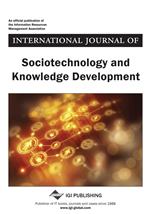 I recently edited a special issue of the International Journal of Sociotechnology and Knowledge Development on the topic of Managing UX Projects. In Part 2 of this special issue, several scholars from the field of Technical and Professional Communication (TPC) provided new approaches to managing user experience design projects within academia and beyond.
I recently edited a special issue of the International Journal of Sociotechnology and Knowledge Development on the topic of Managing UX Projects. In Part 2 of this special issue, several scholars from the field of Technical and Professional Communication (TPC) provided new approaches to managing user experience design projects within academia and beyond.
Why Do We Need New Approaches to Managing UX Projects?
As I explain in my editor’s introduction to the special issue, the title of this special issue is meant to signify that not only do we need scholarly work at the intersections of project management and UX, which was the topic of Part 1 of the special issue, we also need new methodologies for managing UX projects. Not only does the emergence of UX as a field of practice within technical and professional communication create new challenges for project managers of all stripes, in other words, but UX projects in particular create unique challenges that call for new research and design methodologies.
What Do These Approaches Look Like?
- In “UX as disruption: Managing team conflict as a productive resource,” Emma J. Rose and Josh Tenenberg present an approach for using conflicts between developers and UX designers as moments for negotiating design decisions in a manner that favors all parties involved.
- In “Rhythm and cues: Project management tactics for UX in game design,” Rudy McDaniel and Joseph Fanfarelli highlight the importance of gamification for UX and consider how users are persuaded through psychological, physiological, and cultural design tactics through an equal focus on both the designer experience and the user experience.
- In “Mutt methods, minimalism, and guiding heuristics for UX project management,” Andrew Mara and Jessica Jorgensen introduce four heuristic questions for selecting project management approaches that are appropriate to the exigencies of individual UX projects.
- Finally, as a response to these first two articles, in “The turn to learning: A view of
UX project management as organizational learning practice,” William Hart-Davidson reflects on the common challenge for project managers that is at the heart of UX, namely managing the unpredictable, sometimes chaotic process of organizational learning involved.
For the full issue, visit the journal website: http://www.igi-global.com/journals/abstract-announcement/118535.
If you’re an academic, please request that your library subscribe to IJSKD!
And if you’re a member of industry, and want a copy of any of these articles, please let me know.
